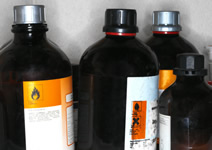Industrial Solvents
Many service members use industrial solvents in regular military tasks such as cleaning, degreasing, paint stripping, and thinning oil-based paints. Too much exposure to some industrial solvents can cause short-term and long-term health effects.
Health effects of exposure to solvents
Exposure to solvents may impact your health depending on the specific chemicals, level of concentration, length of exposure, and how it enters the body.
- Inhaled vapors: These may irritate the eyes, cause drowsiness, difficulty with breathing and if severe, neurological damage
- Direct eye contact: This may cause burning and tearing and if severe, visual problems.
- Skin contact: This may cause skin dryness, irritation, rashes or chemical burns.
- Ingested: Although rare, this can cause serious illness.
Specific solvents
For information on specific solvents, the Agency for Toxic Substances and Disease Registry (ATSDR) provides the following fact sheets:
Health concerns?
If you are concerned about health problems associated with exposure to industrial solvents during your military service, talk to your health care provider or contact your local VA Environmental Health Coordinator to help you get more information from a health care provider.
VA offers a variety of health care benefits to eligible Veterans. Not enrolled in the VA health care system? Find out if you qualify for VA health care.
Compensation benefits for health problems
Veterans may file a claim for disability compensation for health problems they believe are related to exposure to industrial solvents during military service. VA decides these claims on a case-by-case basis. File a claim online.
Learn more about VA benefits.
Industrial Solvents
Veterans may have been exposed to industrial solvents during military service in general job duties.
Many service members use industrial solvents in regular military tasks such as cleaning, degreasing, paint stripping, and thinning oil-based paints.
inhalation, dermal, ingestion
Exposure to solvents may impact your health depending on the specific chemicals, level of concentration, length of exposure, and how it enters the body.
Inhaled Vapors
These may irritate the eyes, cause drowsiness, difficulty with breathing and if severe, neurological damage and certian cancers.
Direct Eye Contact
This may cause burning and tearing and if severe, visual problems.
Skin Contact
This may cause skin dryness, irritation, rashes or chemical burns.
Ingested
Although rare, this can cause serious illness, including certain cancers.
- ATSDR - Benzene FAQs
- https://www.atsdr.cdc.gov/toxfaqs/tfacts3.pdf
- ATSDR - Acetone FAQs
- https://www.atsdr.cdc.gov/toxfaqs/tfacts21.pdf
- ATSDR - Tetrachloroethylene (PCE or PERC) FAQs
- https://www.atsdr.cdc.gov/toxfaqs/tfacts18.pdf
- ATSDR - Trichloroethylene (TCE) FAQs
- https://www.atsdr.cdc.gov/toxfaqs/tfacts19.pdf
- ATSDR - Toluene FAQs
- https://www.atsdr.cdc.gov/toxfaqs/tfacts56.pdf
- ATSDR - Xylenes FAQs
- https://www.atsdr.cdc.gov/toxfaqs/tfacts71.pdf
- NASEM - Review of VA Clinical Guidance for the Health Conditions Identified by the Camp Lejeune Legislation (2015)
- https://www.nap.edu/read/18991/chapter/1
- NRC - Contaminated Water Supplies at Camp Lejeune (2009)
- https://www.nap.edu/read/12618/chapter/1
- NASEM – Gulf War and Health: Insecticides and Solvents (2003)
- https://www.nap.edu/read/10628/chapter/1
- For the most up-to-date information on exposure to industrial solvents, visit: https://www.publichealth.va.gov/exposures/solvents/index.asp.
- Industrial Solvents webpage
- For information about Camp Lejeune, visit: https://www.publichealth.va.gov/exposures/camp-lejeune/index.asp.
- Camp Lejeune webpage
Get a Registry Evaluation
- Environmental Health Coordinator
- https://www.publichealth.va.gov/exposures/coordinators.asp
- Operation Enduring Freedom (OEF) / Operation Iraqi Freedom (OIF) / Operation New Dawn (OND) Team
- https://www.oefoif.va.gov/map.asp
Contact your local https://www.publichealth.va.gov/exposures/coordinators.asp, https://www.oefoif.va.gov/map.asp, or VA Primary Care Team about getting a registry evaluation.
WRIISC Link
- War Related Illness and Injury Study Center (WRIISC)
- https://www.warrelatedillness.va.gov/WARRELATEDILLNESS/referral/index.asp
For evaluation for difficult-to-diagnose conditions, contact your local https://www.warrelatedillness.va.gov/WARRELATEDILLNESS/referral/index.asp.
Camp Lejeune Health Care Law for Family Members
- https://www.publichealth.va.gov/exposures/camp-lejeune/index.asp
Camp Lejeune Health Care Law: Family members who resided at Camp Lejeune for 30 days or more between Jan. 1, 1957 and Dec. 31, 1987 may be eligible for medical care for 15 health conditions:
- Esophageal cancer
- Breast cancer
- Kidney cancer
- Multiple myeloma
- Renal toxicity
- Female infertility
- Scleroderma
- Non-Hodgkin's lymphoma
- Lung cancer
- Bladder cancer
- Leukemia
- Myelodysplastic syndromes
- Hepatic steatosis
- Miscarriage
- Neurobehavioral effects
For more information on policies related to Camp Lejeune, visit:
1957 1987 Cold War USA
Camp Lejeune Presumption
VA presumes that Veterans, Reservists, and National Guard members who served at Camp Lejeune for no less than 30 days from August 1, 1953 through December 31, 1987 and who later developed one of the following eight diseases were exposed to contaminants in the water supply:
- Adult leukemia
- Aplastic anemia and other myelodysplastic syndromes
- Bladder cancer
- Kidney cancer
- Liver cancer
- Multiple myeloma
- Non-Hodgkin's lymphoma
- Parkinson's disease
1953 1987 Cold War USA





















